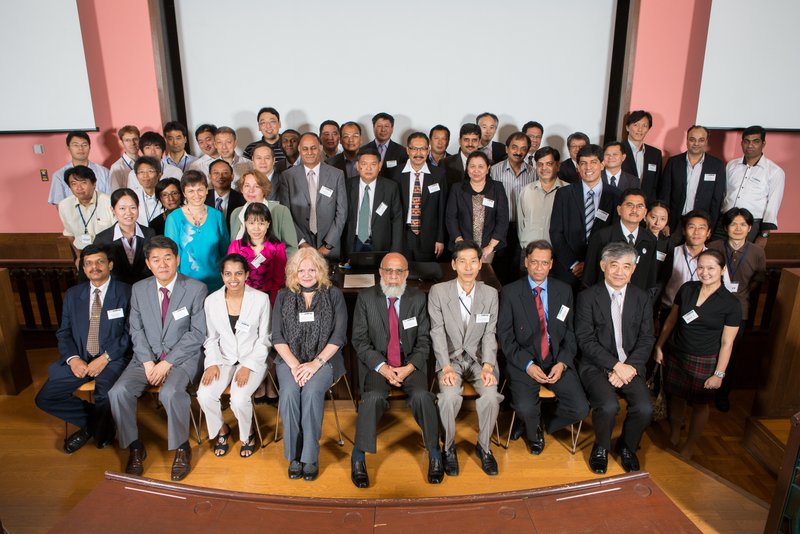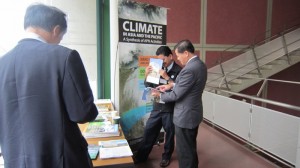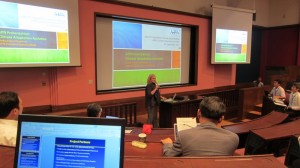 The 9th AWCI international coordination group (ICG) meeting was held on 29-30 September 2012 at Hongo campus, University of Tokyo, Japan. The meeting focused on sharing the outcomes of present and past AWCI research and discussed future activities, which can be implemented through collaboration between Member Countries. Prof. T. Koike, APN project leader and main organizer of the meeting, acknowledged APN for its strong financial support towards the AWCI project and activities.
The 9th AWCI international coordination group (ICG) meeting was held on 29-30 September 2012 at Hongo campus, University of Tokyo, Japan. The meeting focused on sharing the outcomes of present and past AWCI research and discussed future activities, which can be implemented through collaboration between Member Countries. Prof. T. Koike, APN project leader and main organizer of the meeting, acknowledged APN for its strong financial support towards the AWCI project and activities.
APN was invited to give a welcome speech and presentation on its recently developed draft climate change adaptation framework. Dr. Linda Stevenson warmly welcomed all participants and invited all participants to visit the APN booth, which was situated outside of the meeting room. The booth displayed APN publications. During her presentation on the APN climate adaptation framework, she briefly introduced APN activities and acknowledged donor countries. Secondly, she mentioned that during the upcoming 5th Southeast Asia and 4th South Asia Subregional cooperation meetings, APN will attempt to engage both Myanmar and Maldives, respectively, as a step towards potential membership or approved country status. In addition, she highlighted APN’s climate adaptation activities and shared the outcomes of a recent workshop on “APN-ICAS Scoping Workshop to enhance the Climate Adaptation Actions of APN Developing Countries”. Furthermore, she briefly introduced the APN’s climate synthesis report and adaptation policy brief. In addition to that, she introduced APN Metadata portal database (APN’s E-Lib) to the audience, which stores project reports and ongoing project information.
The first day of the meeting focused on two main objectives. One was to discuss and present AWCI current and past project reports. During this session, six APN funded AWCI projects were presented with their research findings and current activities by Prof. T. Koike (ARCP2011-02CMY-Koike), Dr. I. Kaihotsu (CBA2011-02CMY-Kaihotsu) , Prof D. Bae (ARCP2011-05CMY-Bae), Dr. K. Fukami (ARCP2009-01CMY-Fukami), Dr. G. Rasul (CBA2012-03NMY-Rasul) and Dr. O. Ochiai (ARCP2012-16NMY-Ochiai). The second objective was to present ongoing activities of climate change adaptation and water Nexus in each country. During the country report session, Pakistan mentioned an APN funded project under ongoing research activities on climate adaptation.
On the second day, the meeting was divided into three sections A) Inputs from international cooperation activities B) Breakout discussion for implementation planning and C) Research updates. During session one, SAFE, NARBO/JWA, JICA, ADB, ICHARM, and UN-CECAR presented their ongoing activities. In the UN-CECAR presentation, APN was highlighted as partnering in the postgraduate course on Climate Change Downscaling Approaches and Applications (CCDAA), to be held from 9–20 November 2012, in Bangkok, Thailand.
In the discussion session, participants were separated into two groups. The first group focused on identifying the research needs in survey and prototyping, and the second group focused on identifying research needs in prototyping and operational research in water related issues. APN took part as an observer. Both groups presented their outcomes and they identified research themes based on climate issues prominent in each country. Furthermore, in the country base proposed research activities, most countries identified APN as a potential funding source. APN project leaders Prof. Bae and Dr. Rasul actively participated in country discussions sessions and presented group presentations
The workshop on “Meta-Guidelines for Water and Climate Change Adaptation” was held on 1-2 October 2012 back to back with the 9th AWCI international coordination group (ICG) meeting. The APN participated in the first day of the workshop and displayed its publications during the whole workshop. Prof. T. Koike gave opening remarks and acknowledged APN for its strong support not only in AWCI activities, but for the present workshop as well.
The objective of the Workshop on “Meta-Guidelines” for Water and Climate Change Adaptation was to advise and support leaders and policymakers in the Asia-Pacific region on policies and good practices for mitigation and adaptation of the impacts of climate change on water resources management and water services, the Asia-Pacific Water Forum’s (APWF) Steering Group on Water and Climate Change has produced a Framework Document on Water and Climate Adaptation.
As a follow-up action, the Steering Group of APWF (whose secretariat is based in Tokyo, Japan) launched discussions on guidelines for practitioners in using climate change projection methodologies, tools for vulnerability and impact assessments and project screening; and for adaptation strategies and activities.
The document (Asia-Pacific Water Forum, 2012) “Framework Document on Water and Climate Adaptation” for leaders and policymakers in the Asia-Pacific region considers 5 main principles:
• Principle 1: Useable knowledge
– We must support scientists and practitioners to work together and develop knowledge that leads to effective actions and increased awareness knowledge
• Principle 2: No Regret Investments
– We must identify and implement approaches that improve water security over a wide range of potential conditions, including current climate variability
• Principle 3: Resilience
– We must build societies’ capacity to develop communities’ resilience in the face of a changing climate
• Principle 4: Mitigation and Adaptation
– We must adopt optimal combinations of measures
•Principle 5: Financing
– We must increase dedicated financing substantially
Based on preliminary reviewers, the Steering Group concluded that the proposed guidelines should take the form of a synthesis “meta-guidelines” and critical interpretation of the body of the work in the Framework. As such, the present workshop’s aim was to synthesize key issues; summarize key directions and inform the preparation of guidelines by national and local governments and for projects, through discussion of the following key questions:
- How to bridge the gap of useable knowledge?
- How to synergize adaptation of IWRM?
- How to develop capacity and resilience?
- How to plan and decide on investments?
- How to make best use of climate finance?
Dr. Rasul, Chief Meteorologist from the Pakistan Meteorological Department and APN Project leader, posed a couple of questions that would be discussed later during the discussion session. He asked, “What is useable knowledge and for whom?” He stressed that for researchers and experts, knowledge is to know the nature of the problem, ground realities and capacity of local communities. For decision makers, knowledge is the results of research that is applicable practically; and knowledge for the public and private sectors includes infrastructure for climate resilience. For planners and designers he noted that science based future vision of climate change and variability is needed.
All very much food for thought and the APN looks forward to disseminating the outputs of this important workshop as they become available.

